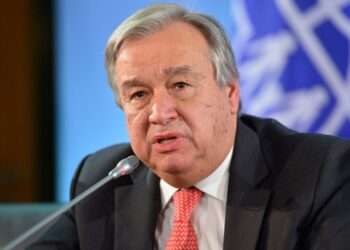On the eve of the G20 Leaders’ Summit in Rio de Janeiro, UN Secretary-General António Guterres issued a powerful call to action, urging the world’s leading economies to step up in addressing pressing global challenges.
Guterres emphasized that G20 nations must harness their significant economic and diplomatic influence to push for peace, climate action, fair financial systems, and equitable technological growth.
“I have come to Rio with a simple message: G20 leaders must lead,” Guterres stated, highlighting that these countries hold unparalleled power and must use it to drive solutions to the world’s most urgent problems.
He noted that the current geopolitical landscape is marked by escalating conflicts, inequality, and faltering progress in addressing poverty and hunger. “We must step up for peace in Gaza, Lebanon, Ukraine, and Sudan,” he said, underscoring that peaceful resolutions must align with the UN Charter and uphold state sovereignty and integrity.
The Secretary-General’s remarks followed his arrival from the COP29 climate conference in Baku, Azerbaijan, where he witnessed firsthand the difficulties faced by nations trying to combat the climate crisis amid stalled negotiations.

A Broken Financial System
Turning to economic issues, Guterres pointed out that the current global financial system fails to support vulnerable nations facing economic turmoil. He called the system “outdated, ineffective, and unfair,” emphasizing that it disproportionately impacts countries that had little role in creating these challenges.
“The global community is looking to the G20 to deliver,” Guterres declared, referencing the Pact for the Future adopted by UN member states in September. This pact aims to revamp multilateral cooperation and tackle the Sustainable Development Goals (SDGs), which are currently off-track.
The Secretary-General argued that ambitious reforms are necessary to ensure the financial system reflects today’s global economy and better serves developing nations. These changes include giving these countries a stronger voice in financial institutions and boosting the lending power of multilateral development banks.
He also urged innovative approaches to finance, such as enhancing tax cooperation and exploring new funding mechanisms.
Climate Crisis Urgency
With the world teetering on the brink of a climate catastrophe, Guterres made an impassioned plea for the G20 to commit to stronger climate action.
Current policies, he warned, are leading to a disastrous 3.1-degree Celsius rise in global temperatures by the end of the century. “The heat is on,” he said. “Failure is not an option.”
G20 nations, which account for 80 percent of global carbon emissions, have a pivotal role in this battle. Guterres called on them to present national climate plans that adhere to the 1.5-degree target agreed upon in previous years.
He stressed that high-ambition climate plans and increased financial support for developing nations are essential for trust-building and substantial progress.
Guterres also raised the growing problem of climate misinformation, which ranges from outright denial to greenwashing and the harassment of climate scientists.
To combat this, he announced the UN’s launch of the Global Initiative for Information Integrity on Climate Change, in collaboration with Brazil and UNESCO. This initiative aims to tackle false information that undermines climate action and public understanding.
“Leadership by example from the world’s largest economies and emitters is needed now more than ever,” Guterres said, urging the G20 to deliver concrete results.
While the summit brings together leaders with differing priorities and pressures, the Secretary-General remains cautiously optimistic. He asserted that a successful outcome is still attainable, but will demand significant leadership and compromise. Guterres called on G20 leaders to make decisions that prioritize collective global welfare over short-term national interests.
READ ALSO: A Call to Self-Reflection on the Future of Ghana’s Middle Class





















